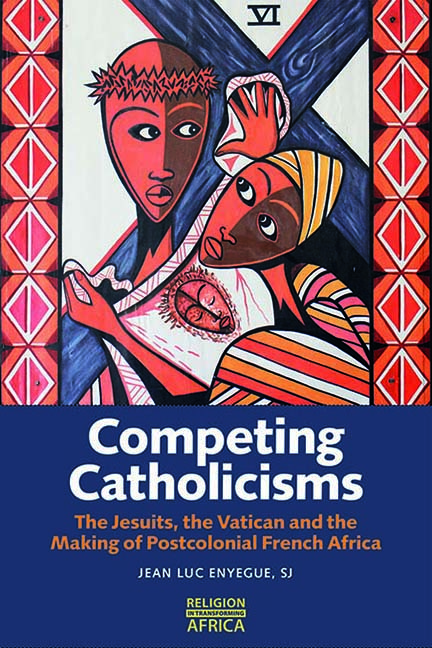Book contents
- Frontmatter
- Dedication
- Contents
- List of Illustrations
- Acknowledgements
- List of Abbreviations
- Glossary
- Chronology of Jesuit Missions in Chad and Cameroon
- Introduction: The End of the Jesuit Mission in Africa?
- Part I The Jesuit Project in West Africa: French Catholicism and Colonialism in Chad, 1935–58
- Part II The Outward Mission: Education and Competing Catholicisms
- Part III The Postcolonial Mission and Catholicity: From Chad to Cameroon, 1962–78
- Conclusion
- Bibliography
- Index
- Previously published titles in the series
6 - Era of Revolution: Bishop Paul Dalmais and Chad’s Cultural Revolution, 1958–75
Published online by Cambridge University Press: 16 July 2022
- Frontmatter
- Dedication
- Contents
- List of Illustrations
- Acknowledgements
- List of Abbreviations
- Glossary
- Chronology of Jesuit Missions in Chad and Cameroon
- Introduction: The End of the Jesuit Mission in Africa?
- Part I The Jesuit Project in West Africa: French Catholicism and Colonialism in Chad, 1935–58
- Part II The Outward Mission: Education and Competing Catholicisms
- Part III The Postcolonial Mission and Catholicity: From Chad to Cameroon, 1962–78
- Conclusion
- Bibliography
- Index
- Previously published titles in the series
Summary
In one of his sermons given in 1964, Jesuit Father Raymond de Fenoyl preached of the necessity ‘to love one's country with all his heart, even more with his arms’. His words had a different resonance for the Jesuits listening to him. Some of them heard an echo of an old maxim of their founder Ignatius of Loyola: that love must be put into actions rather than words. For others, the question was what did it mean to love Chad with one's arms, four years after independence? De Fenoyl was newly appointed superior of the Chad Mission in replacement of Dalmais who, in 1958, was appointed archbishop of Fort-Lamy.
The episcopate of Dalmais (from 1958 to 1979) helps us to understand the complex situation of missionary Christianity immediately after the independence of Chad. Born in Lyon, France, in 1917, Dalmais joined the Jesuit order on 17 October 1936. He was ordained to the priesthood in the Cathedral of Lyon on 31 July 1949 and joined the Chad Mission two years later. On 16 February 1955, he was appointed superior of the Jesuit Chad Mission. He became bishop of Fort-Lamy, today's capital city of N’Djamena, on 13 April 1958. He retired as archbishop of N’Djamena in 1980, and went back to the Jesuit community in Congo Brazzaville. Exhausted and sick, he returned to Lyon in 1991, where he died on 23 July 1994.
Dalmais led the Church in Chad in the context of the Chadian Rite Controversy and Chad's Cultural Revolution (1973–75). In previous chapters, Catholic missions had failed to raise an African political and religious elite. Chad Protestantism, in contrast, already had a well-trained Chadian leadership. This chapter argues that the rise to power of President François Tombalbaye, a Protestant, and the subsequent persecution of Christians (especially Protestants) during his Cultural Revolution confirmed Jesuit missionaries’ pragmatic approach to Chad's traditions and their aversion to a Christian elite in Africa.
Once political power had shifted from Europeans to Africans, the lives of African Church leaders were less safe than those of their European colleagues. African political leaders imprisoned, exiled, and murdered leading African ecclesiastics. European missionaries, in contrast, were simply expelled. The cost for Africans in leadership was greater than that of Europeans holding the same positions. As a result, Africanising the Church did not guarantee preservation of the Church after African independence.
- Type
- Chapter
- Information
- Competing CatholicismsThe Jesuits, the Vatican and the Making of Postcolonial French Africa, pp. 141 - 172Publisher: Boydell & BrewerPrint publication year: 2022



